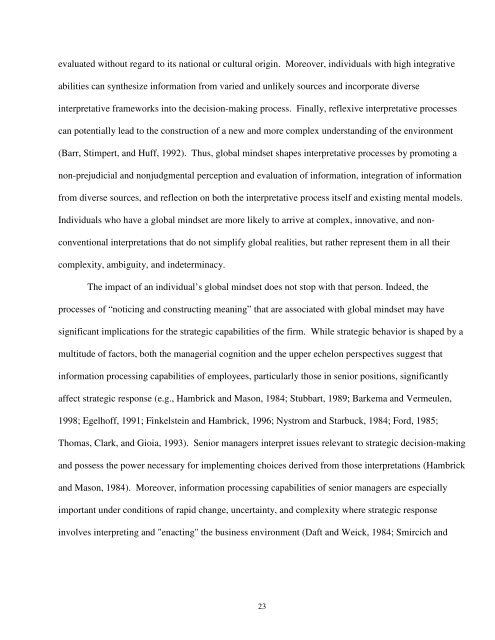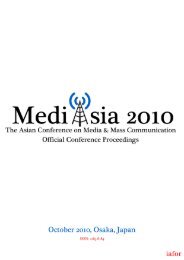What We Talk About When We Talk About “Global Mindset”
What We Talk About When We Talk About “Global Mindset”
What We Talk About When We Talk About “Global Mindset”
You also want an ePaper? Increase the reach of your titles
YUMPU automatically turns print PDFs into web optimized ePapers that Google loves.
evaluated without regard to its national or cultural origin. Moreover, individuals with high integrative<br />
abilities can synthesize information from varied and unlikely sources and incorporate diverse<br />
interpretative frameworks into the decision-making process. Finally, reflexive interpretative processes<br />
can potentially lead to the construction of a new and more complex understanding of the environment<br />
(Barr, Stimpert, and Huff, 1992). Thus, global mindset shapes interpretative processes by promoting a<br />
non-prejudicial and nonjudgmental perception and evaluation of information, integration of information<br />
from diverse sources, and reflection on both the interpretative process itself and existing mental models.<br />
Individuals who have a global mindset are more likely to arrive at complex, innovative, and non-<br />
conventional interpretations that do not simplify global realities, but rather represent them in all their<br />
complexity, ambiguity, and indeterminacy.<br />
The impact of an individual’s global mindset does not stop with that person. Indeed, the<br />
processes of “noticing and constructing meaning” that are associated with global mindset may have<br />
significant implications for the strategic capabilities of the firm. While strategic behavior is shaped by a<br />
multitude of factors, both the managerial cognition and the upper echelon perspectives suggest that<br />
information processing capabilities of employees, particularly those in senior positions, significantly<br />
affect strategic response (e.g., Hambrick and Mason, 1984; Stubbart, 1989; Barkema and Vermeulen,<br />
1998; Egelhoff, 1991; Finkelstein and Hambrick, 1996; Nystrom and Starbuck, 1984; Ford, 1985;<br />
Thomas, Clark, and Gioia, 1993). Senior managers interpret issues relevant to strategic decision-making<br />
and possess the power necessary for implementing choices derived from those interpretations (Hambrick<br />
and Mason, 1984). Moreover, information processing capabilities of senior managers are especially<br />
important under conditions of rapid change, uncertainty, and complexity where strategic response<br />
involves interpreting and "enacting" the business environment (Daft and <strong>We</strong>ick, 1984; Smircich and<br />
23









